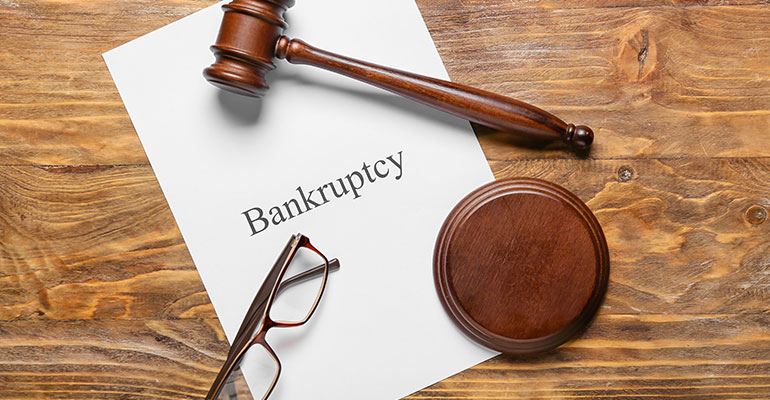
Wage garnishment can be a significant financial burden for individuals who are already struggling to make ends meet. Fortunately, bankruptcy may be able to provide relief from wage garnishment. In this post, we’ll explore the question, “Can bankruptcy stop wage garnishment?” and provide a detailed explanation of how bankruptcy can help those facing wage garnishment.
What Is Wage Garnishment?
An employer may legally withhold a portion of a worker’s wages to settle a debt to a creditor through a process known as wage garnishment. When someone falls behind on their credit card, medical bill, student loan, or other debt payments, this can happen. When a creditor obtains a judgment against an individual, they can seek a court order for wage garnishment. The employer is then required to withhold a portion of the individual’s wages and send it directly to the creditor to pay off the debt.
Can Bankruptcy Stop Wage Garnishment?
Yes, filing for bankruptcy can stop wage garnishment. When an individual files for bankruptcy, an automatic stay is put in place, which prevents creditors from taking any further collection actions against the debtor. This includes wage garnishment.
The automatic stay is a powerful tool for debtors, as it stops all collection actions, including phone calls, letters, lawsuits, and wage garnishment. The automatic stay remains in effect throughout the bankruptcy process, which can last anywhere from a few months to several years, depending on the type of bankruptcy filed.
What Types of Bankruptcy Can Stop Wage Garnishment?
Both Chapter 7 and Chapter 13 bankruptcy can stop wage garnishment, but each has different requirements and outcomes.
- Chapter 7 Bankruptcy: Due to the fact that non-exempt assets are sold to settle debts, this type of bankruptcy is also known as liquidation bankruptcy. People who meet certain income requirements and can pass a means test are eligible for Chapter 7 bankruptcy. An automatic stay is put into place following the filing of a Chapter 7 bankruptcy petition, stopping wage garnishment and other collection efforts. Unsecured debts, such as credit card debt and medical bills, can frequently be discharged in Chapter 7 bankruptcy, giving the debtor a new financial start.
- Chapter 13 Bankruptcy: Due to the fact that it entails developing a repayment plan to pay off creditors over a period of three to five years, this type of bankruptcy is also known as a reorganization bankruptcy. Chapter 13 bankruptcy is available to individuals who have a regular income and have debts that fall below a certain threshold. Once a Chapter 13 bankruptcy petition is filed, an automatic stay goes into effect, stopping wage garnishment and other collection actions. The debtor then works with a bankruptcy trustee to create a repayment plan that is approved by the court. In many cases, unsecured debts, such as credit card debt and medical bills, can be discharged after the repayment plan is completed.
What Happens to Wage Garnishment during Bankruptcy?
Once an individual files for bankruptcy and the automatic stay goes into effect, wage garnishment must stop immediately. The employer is notified of the automatic stay and instructed to stop withholding wages for the creditor. In some cases, the creditor may be able to petition the court to lift the automatic stay and continue with wage garnishment, but this is rare and requires a compelling reason.
If wage garnishment has already taken place, the debtor may be able to recover some of the wages withheld during the 90 days prior to filing for bankruptcy. This is known as a preference action and requires the debtor to file a motion with the court.
What Are the Benefits of Stopping Wage Garnishment through Bankruptcy?
Stopping wage garnishment through bankruptcy can provide several benefits for individuals struggling with debt.
First and foremost, it provides immediate relief from the financial burden of wage garnishment. The automatic stay goes into effect as soon as the bankruptcy petition is filed, and wage garnishment must stop immediately. This can provide much-needed breathing room for individuals who are already struggling to make ends meet.
In addition to stopping wage garnishment, bankruptcy can provide other benefits, such as discharging unsecured debts, such as credit card debt and medical bills. This can provide a fresh financial start for individuals who are overwhelmed with debt and struggling to keep up with their payments.
Bankruptcy can also provide protection from other collection actions, such as phone calls, letters, and lawsuits. The automatic stay stops all collection actions, giving debtors time to work with their bankruptcy trustee and create a plan to get back on track financially.
What Are the Downsides of Stopping Wage Garnishment through Bankruptcy?
Stopping wage garnishment through bankruptcy is not without its downsides. Filing for bankruptcy can have a negative impact on an individual’s credit score, and the bankruptcy will remain on their credit report for up to ten years. This can make it more difficult to obtain credit in the future and may result in higher interest rates and fees.
In addition, filing for bankruptcy can be a complex and time-consuming process. People who are thinking about filing for bankruptcy should consult with an experienced bankruptcy lawyer to make sure their petition is submitted properly and that they are aware of the repercussions of doing so.
Filing for bankruptcy can stop wage garnishment and provide much-needed relief for individuals who are struggling with debt. Both Chapter 7 and Chapter 13 bankruptcy can provide protection from wage garnishment, as well as other collection actions, such as phone calls, letters, and lawsuits.
However, filing for bankruptcy is not without its downsides, and individuals should carefully consider the implications of filing for bankruptcy before proceeding. Working with an experienced bankruptcy attorney and engaging help from tax resolution/consultation services can help individuals understand their options and make an informed decision about whether bankruptcy is the right choice for them.
